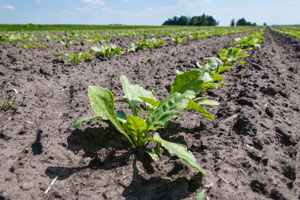
As the temperatures begin to dip throughout most of the country, and “chilly” instead of “balmy” is used to describe the night air, you need to start thinking about protecting your crops from frost. Frost can easily injure plants by causing ice crystals to form within the plant cells. When these crystals form, water becomes unavailable to the plant tissues, which causes the leaves to appear to be water-soaked, shriveled, brown, or black. To help you protect your crops from frost during the late fall season, we have gathered together a few helpful tips.
4 Tips To Protect Crops From Frost
- Covering your crops. — Small acreage, low-growing commercial crops can easily be covered with straw mulch, plastic, tar paper, or reemay cloth to protect them from frost. These coverings work to reduce the heat loss from the ground and plant’s surface, and, in doing so, protect the crops from the drop in nightly temperatures. Covers should be removed during the day when the sun is out.
- Fog clouds. — Using fog clouds can help farmers protect their crops from frost. The fog reduces the amount of radiative heat loss from the surface. However, it is difficult to maintain the correct fog coverage across all crops; as such, this is an effective but less reliable method to protect crops from the harsh effects of frost.
- Water correctly. — The right watering tactics can be used to protect crops during a night frost. The soil should be thoroughly watered during the day. The wetter soil will hold the heat better than the dry soil, which will protect the crops’ roots and keep the surface temperature from dropping too low. The appropriate irrigation system can help you to more easily water your crops based on the predicted nightly temperature.
- Use heat lamps. — On small acreage farms, 100-watt lamps can be used to emit warmth and reduce frost damage. If possible, cluster container plants together underneath the lamp. If the plants or crops cannot be transplanted, then hang the heat lamps, so that their rays cover a larger area.
With these tips at the ready, you will be able to actively protect your crops from frost. Do you need help finding the right tools to protect your crops? Do you want to learn additional tips? If so, contact an expert at W.P. Law, Inc. Since 1979, W.P. Law has been helping farmers protect their crops throughout all seasons and temperature changes.








